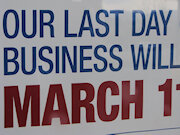SURVIVORS: FAMILY BUSINESSES THAT LAST

The phrase "family business" makes some people automatically think of mom-and-pop stores in small towns. But as you probably know, family-operated companies include everything from husband-and-wife sole proprietorships to companies like Mars Inc., the candy bar and food product company that employs about 70,000 people. For a perspective of just where family business fits into the landscape of commerce and employment in America, look at these facts from a study at Kennesaw State University in Georgia.
- 50 percent of the nation's gross domestic product can be attributed to family-run businesses.
- 60 percent of total employment in the U.S. stems from family-owned businesses, as well as 78 percent of all new jobs and 65 percent of all wages paid.
- 35 percent of family-owned businesses are Fortune 500 companies, including Ford, Wal-Mart, and Anheuser-Busch.
- 60 percent of all public companies are family-controlled.
Judging from these statistics, family businesses are the backbone of our economy. While studies indicate that 30 percent of family companies fail within 20 years, a large number of these businesses have endured for hundreds of years.
The Family Institute of Enterprise at Bryant University in Rhode Island recently compiled a list of the oldest family companies in America. The results of its study might surprise you. To be included on Bryant's list, a business must still be operating in the state of its origin, and, if it has become a public company, the family must maintain meaningful control. Among the oldest survivors:
Tuttle Market Gardens, a grower of vegetables and strawberries that began around 1640 in New Hampshire. Tuttle also runs an on-site retail shop.
Several still-functioning East Coast farms that began in the late 1600s to early 1700s and boast that their ancestors fed the colonial soldiers during the Revolutionary War. They include the Barker Farm of Massachusetts, the Miller Farm of Delaware and the Lyman Farm of Connecticut.
Laird & Co., a New Jersey family distillery, which began large-scale production of applejack brandy in the early 1700s. Laird's history includes the fact that it once received a request for its brandy recipe from a Virginia farmer named George Washington.
Other survivors with names you might recognize:
- Antoine's Restaurant, in New Orleans, Louisiana, which began in 1840 and is currently operated by the fifth generation of the family of its founder, Antoine Alciatore.
- Levi Strauss, which has overcome numerous obstacles and continued in business since its inception in 1853 in San Francisco, California. Strauss now employs 11,000 people worldwide.
- Anheuser-Busch, started in 1860 by Eberhard Anheuser and Adolphus Busch. Today Anheuser-Busch is the nation's largest brewer, capturing nearly half of the U.S. beer market.
Survival Factors
In an environment where an estimated three out of 10 family businesses fail within two generations, what is it about these companies that keeps them surviving? Size and name-recognition are not key factors. For example, look at the Barker Farm of Massachusetts, which produces apples and dairy products. Now in its eleventh generation, the farm has been operating since 1642, and has only one full-time employee.
Business historian Etna M. Kelley notes that a high percentage of family companies that survive supply basic needs, such as food. She points out that two of the most enduring businesses are those that service the beginning of life ... and the end: seed companies and funeral homes.
Another basic need is provided by Levi Strauss, which started by making sturdy work clothes for the Gold Rush '49ers. Also on the list of survivor companies are distilleries and breweries, such as Anheuser-Busch.
One factor that seems to be key among successful businesses: They exercise objective judgment in assessing their operations rather than making decisions based on emotion and tradition. That may mean appointing an objective advisory board made up of non-family members with a variety of business strengths, such as accountants, attorneys and bankers. While any business can benefit from objective oversight, it's even more important for family companies that can get mired in personal issues.
Finally, it seems safe to assume that businesses that survive for any length of time have benefited from shrewd foresight. Planning for both economic downturns and for timely expansions has helped keep the doors of survivor businesses open through decades and even centuries.
